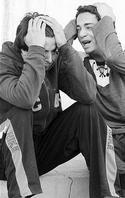
Brothers cry outside a hospital morgue as they wait to claim the body of their father, who was killed on a minibus during a raid in Baghdad's Sadr City yesterday. United States troops, searching for a kidnapped American soldier, opened fire on a minibus, killing four passengers, during a raid on Baghdad's Sadr City district, yesterday. - Reuters
BAGHDAD (Reuters):
Six car bombs killed 160 people in a Shi'ite stronghold yesterday in the bloodiest attack in Baghdad since the U.S. invasion and the authorities imposed an indefinite curfew on a city fearful of a sectarian civil war.
A further 268 people were wounded in the series of blasts in the capital's Sadr City slum, a Health Ministry official said.
The blasts came at the same time as gunmen surrounded and fired on the Shi'ite-run Health Ministry in one of the boldest daylight assaults by militants in Baghdad. Mortars later crashed down onto a nearby Sunni enclave in an apparent reprisal attack.
After dark, there was sporadic gunfire in several districts.
In Sadr City, parked vehicles packed with explosives caused carnage in streets and a market, a police general told state television. Mortars also landed nearby and residents seized a seventh car they said was driven by a would-be suicide bomber.
"I was out shopping. As the bombs went off, everyone started running and shouting," news photographer, Kareem al-Rubaie, said.
Blood all over
"I saw a car from a wedding party, covered in ribbons and flowers. It was burning. There were pools of blood on the street and children dead on the ground."
Heavily guarded and policed by the Mehdi Army militia of radical Shi'ite cleric Moqtada al-Sadr, Sadr City was until in this year relatively unscathed by attacks by al Qaeda and other Sunni insurgents. A string of bombings against civilians there in recent months have been seen as a declaration of war on the militia, which Sunnis blame for a wave of death squad violence.
The bloodshed may heighten sectarian anger after a week of tension inside the U.S.-backed national unity Government. Washington is pressing Shi'ite and minority Sunni leaders to rein in militants to halt a slide towards all-out civil war.

